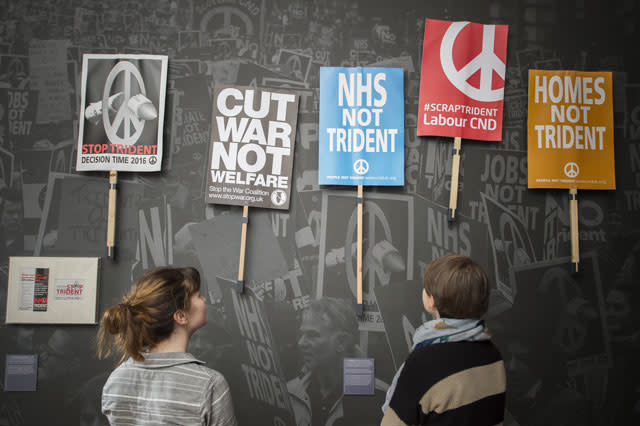Hate-filled cartoons and letters to conscientious objectors go on display

Hate mail and a cartoon depicting a person as "lazy" for refusing to fight are among documents and images released to mark International Conscientious Objectors Day.
The Imperial War Museums (IWM) has revealed letters, photographs, cartoons and posters which explore the harsh treatment of conscientious objectors in the two world wars as they took a stand against conscription into the armed forces.
Some 16,000 men became conscientious objectors in the First World War for religious, political or moral reasons after conscription was introduced in 1916, while 62,000 men and 1,000 women took a stand against fighting in the Second World War.
In the First World War, conscientious objectors were assessed by a local tribunal, which rarely granted absolute exemption, instead enlisting them in the Army, including the Non-Combatant Corps, where many disobeyed orders and ended up in prison.
Soon a system was introduced in which imprisoned conscientious objectors had the chance to swap prison for work centres, where they would be employed doing work not directly related to the war, though absolutists remained in prison.
There was a fairer system in the Second World War with more impartial local tribunals and more effort to find them alternative work, though some absolutists rejected the move.
Details of their experiences are on display at IWM London, as part of the current exhibition People Power: Fighting for Peace, which charts the anti-war movement from the First World War to the present day.
First World War postcards reveal conditions faced by those who went to prison for their beliefs. Attitudes to them are shown in a cartoon of a conscientious objector relaxing at home while the rest of his family does their bit for the war effort.
Hate mail written to Reginald Porcas, an absolutist conscientious objector from Norbury, south London, in the Second World War, accuses him of being a "dirty sniffling coward".
Another letter urges him to go and live in Germany "you white livered cur", if he does not think Britain is worth fighting for, and expresses the hope a "German bomb will smash you to smithereens".
The exhibition documents the experiences of other individual objectors, including women, and has photographs of the tribunals they went through.
And it includes recordings and documents of Yes Minister and The Good Life star Paul Eddington, a Quaker who was called up and exempted from fighting on condition he performed for the Entertainments National Service Association (Ensa).
Curator Matt Brosnan said the experiences of conscientious objectors were a key part of what vocal opponents of war went through over the past century.
"Choosing to be a conscientious objector would have been extremely difficult decision and not one taken likely," he said.
"These documents and images on display in IWM's exhibition People Power: Fighting for Peace illustrate the personal struggles anti-war figures have faced over the years.
"It took real courage to go against the grain, whether that meant facing a tribunal, doing alternative service or being imprisoned for their beliefs," he said.


